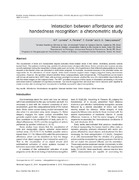Use este identificador para citar ou linkar para este item:
https://repositorio.ufrn.br/handle/123456789/23132| Título: | Interaction between affordance and handedness recognition: a chronometric study |
| Autor(es): | Lameira, A.P. Pereira, A. Conde, E. Gawryszewski, L.G. |
| Palavras-chave: | Affordance;Handedness recognition;Manual reaction time;Motor imagery;Mirror neurons |
| Data do documento: | 13-Fev-2015 |
| Resumo: | The visualization of tools and manipulable objects activates motor-related areas in the cortex, facilitating possible actions toward them. This pattern of activity may underlie the phenomenon of object affordance. Some cortical motor neurons are also covertly activated during the recognition of body parts such as hands. One hypothesis is that different subpopulations of motor neurons in the frontal cortex are activated in each motor program; for example, canonical neurons in the premotor cortex are responsible for the affordance of visual objects, while mirror neurons support motor imagery triggered during handedness recognition. However, the question remains whether these subpopulations work independently. This hypothesis can be tested with a manual reaction time (MRT) task with a priming paradigm to evaluate whether the view of a manipulable object interferes with the motor imagery of the subject's hand. The MRT provides a measure of the course of information processing in the brain and allows indirect evaluation of cognitive processes. Our results suggest that canonical and mirror neurons work together to create a motor plan involving hand movements to facilitate successful object manipulation. |
| URI: | https://repositorio.ufrn.br/jspui/handle/123456789/23132 |
| Aparece nas coleções: | ICe - Artigos publicados em periódicos |
Arquivos associados a este item:
| Arquivo | Descrição | Tamanho | Formato | |
|---|---|---|---|---|
| Interaction between affordance and handedness recognition.pdf | AntonioPereira_ICe_Interaction between affordance_2015 | 182,17 kB | Adobe PDF |  Visualizar/Abrir |
Os itens no repositório estão protegidos por copyright, com todos os direitos reservados, salvo quando é indicado o contrário.

